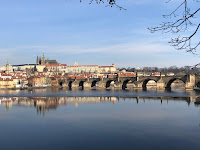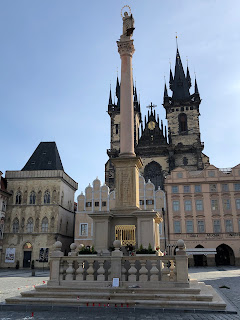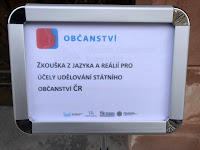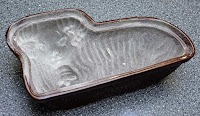 I'm headed to Prague on Friday to take my Czech citizenship test and my B1 language test. I'm not worried at all about the citizenship test but I'm nervous about the language test. Fingers crossed that it all goes well.
I'm headed to Prague on Friday to take my Czech citizenship test and my B1 language test. I'm not worried at all about the citizenship test but I'm nervous about the language test. Fingers crossed that it all goes well.
A common question I get is "how hard is it to learn Czech"? The short answer is that it's hella' hard! There are lots of reasons why Czech can be difficult to learn. Some people take pride that "Czech is one of the hardest languages in the world to learn". While there are times that it feels that way, there are way more difficult languages to learn.
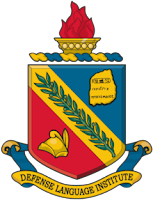 The Defense Language Institute (DLI), in California, is the language school where the U.S., trains all of its military linguists. Students study a foreign language full time, for seven hours a day, five days a week, with 3-4 hours of homework every day. Completion of a basic course is basically more or less the equivalent of the CEFR B1 level.
The Defense Language Institute (DLI), in California, is the language school where the U.S., trains all of its military linguists. Students study a foreign language full time, for seven hours a day, five days a week, with 3-4 hours of homework every day. Completion of a basic course is basically more or less the equivalent of the CEFR B1 level.
The length of the course depends on the difficulty of the language. All languages are rated from 1 to 4 with category 4 languages being the most difficult to learn for a native English speaker.
Category I languages have 26 weeks of instruction. This includes French, Italian, Portuguese, and Spanish.
Category II languages take 34 weeks. This includes German, Romanian, and Indonesian.
 Category III languages take 48 weeks. All of the Slavic languages are 3's. So Czech, Polish, Russian, Ukrainian, Bulgarian, and Serbian/Croatian. Plus Farsi, Hebrew, Hungarian, Greek, Albanian, Hindi, Tagalog, Thai, Turkish, Urdu, Uzbek and Vietnamese.
Category III languages take 48 weeks. All of the Slavic languages are 3's. So Czech, Polish, Russian, Ukrainian, Bulgarian, and Serbian/Croatian. Plus Farsi, Hebrew, Hungarian, Greek, Albanian, Hindi, Tagalog, Thai, Turkish, Urdu, Uzbek and Vietnamese.
Category IV languages take 64 weeks to complete the basic course. This includes Arabic, Mandarin Chinese, Japanese, Korean, and Pashto.
I grew up during the Cold War and when I was in the military they still taught people how to speak German, Czech, and Polish. These languages aren't even taught there anymore.
 The Foreign Service Institute (FSI) is the language school for the U.S. Department of State where American diplomats get their language training. FSI courses have 25 hours of class each week with 3-4 hours of homework every day. FSI has five difficulty categories.
The Foreign Service Institute (FSI) is the language school for the U.S. Department of State where American diplomats get their language training. FSI courses have 25 hours of class each week with 3-4 hours of homework every day. FSI has five difficulty categories.
Category I languages last 23-24 weeks which equates to 575-600 hours of training. Category I languages are the Romance and Germanic languages, except for German. So Afrikans, Dutch, Norwegian, Swedish, French, Italian, Portuguese, Romanian, and Spanish.
The only category II language is German. The course lasts for 30 weeks which is 750 hours of study.
Category III languages last for 36 weeks (900 hours) and include Indonesian, Malaysian, and Swahili.
 Category IV languages take 44 weeks to complete which is 1100 hours of training. This is pretty much the same as the DLI Category III languages. All of the Slavic languages - Czech, Slovak, Polish, Russian, Bulgarian, Serbian, Croatian, Macedonian, and Ukrainian. The Baltic languages Estonian, Latvian, and Lithuanian. Plus Albanian, Armenian, Azeri, Burmese, Farsi, Finnish, Georgian, Greek, Hebrew, Hungarian, Hindi, Khmer, Lao, Pasto, Tagalog, Thai, Turkish, Vietnamese, Xhosa, and Zulu.
Category IV languages take 44 weeks to complete which is 1100 hours of training. This is pretty much the same as the DLI Category III languages. All of the Slavic languages - Czech, Slovak, Polish, Russian, Bulgarian, Serbian, Croatian, Macedonian, and Ukrainian. The Baltic languages Estonian, Latvian, and Lithuanian. Plus Albanian, Armenian, Azeri, Burmese, Farsi, Finnish, Georgian, Greek, Hebrew, Hungarian, Hindi, Khmer, Lao, Pasto, Tagalog, Thai, Turkish, Vietnamese, Xhosa, and Zulu.
Category V languages take 88 weeks to complete. A whopping 2200 hours. These are Arabic, Mandarin Chinese, Cantonese Chinese, Japanese, and Korean.
To me it's interesting how both DLI and FSI sometimes have different opinions as to a language's difficulty. DLI had German, Romanian, and Indonesian as equally difficult while FSI says Romanian is easier than German but German is easier than Indonesian. Or how DLI has Pashto at the same difficulty level as Arabic or Chinese but FSI has Pashto at the same level as Czech.
Here's the FSI language difficulty map for Europe.
So how hard is Czech? Pretty dang difficult! Especially for a native-English speaker. Though not the most difficult language out there. In the end however it really doesn't matter. As long as I pass my exam.
Update: I found some graduation numbers for DLI.
- Czech was taught from 1971-2002 and again in 2017. The top year was 1985. In total 3.420 people graduated from the Czech programme.
- Slovak was taught from 1984-1986, 1991-1993, and in 1995. Only 144 people completed Slovak.
- German was taught from 1965-2018 and 1986 was the top year. German had 13.699 graduates.
 Jsme fér (We are fair) is a coalition of non-profit organisations that started in 2017 and campaigns for same-sex marriage here in Czechland. It is made up of Amnesty International Czech Republic, Logos Czech Republic, Mezipatra, PROUD, Prague Pride, and Queer Geography.
Jsme fér (We are fair) is a coalition of non-profit organisations that started in 2017 and campaigns for same-sex marriage here in Czechland. It is made up of Amnesty International Czech Republic, Logos Czech Republic, Mezipatra, PROUD, Prague Pride, and Queer Geography.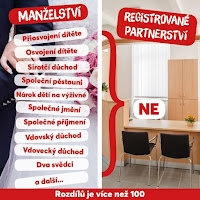 Czechland was the first post-Iron Curtain country to provide any sort of legislative protection for gays when it allowed for registered partnerships back in 2006. While this was an important step it is not the same thing as marriage. There are more than 100 legal differences that exist between marriage and registered partnerships.
Czechland was the first post-Iron Curtain country to provide any sort of legislative protection for gays when it allowed for registered partnerships back in 2006. While this was an important step it is not the same thing as marriage. There are more than 100 legal differences that exist between marriage and registered partnerships. The promising thing is that support for equal marriage has increased dramatically over the years with currently about 67% of the country in favour of it.
The promising thing is that support for equal marriage has increased dramatically over the years with currently about 67% of the country in favour of it.











